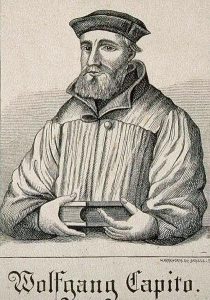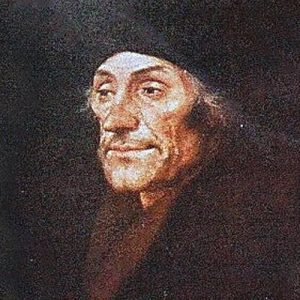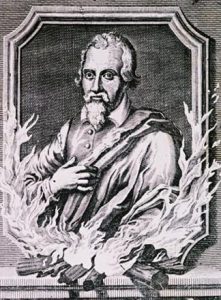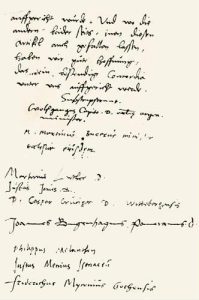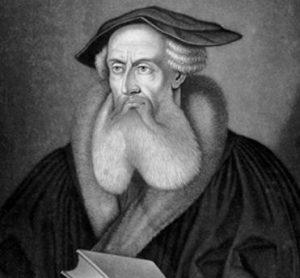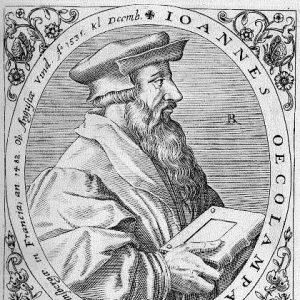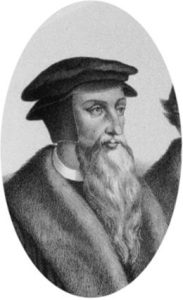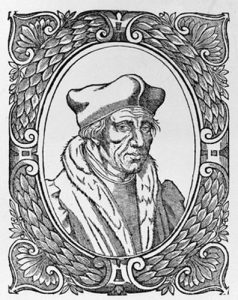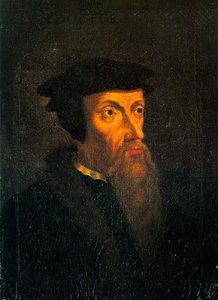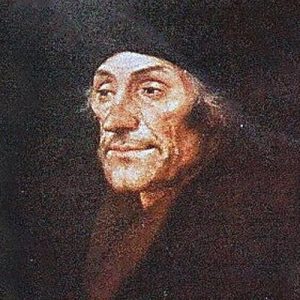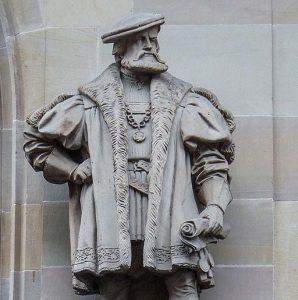A moderate theologian
Wolfgang Capiton was born in Haguenau, where his father was a master blacksmith. He studied medicine at Ingolstadt University (Bavaria) and theology in Friburg and obtained his doctorate in 1515. During his education he obtained three doctorates, was in contact with humanists of the Rhineland, and met Mathieu Zell and Jacques Strum, also in favour of the Reformation.
He preached at the Cathedral in Basel and taught theology at the University. His commentaries on the Epistle to the Romans and his preaching were very much appreciated. He was an excellent hebraist, which Erasmus noticed and asked him to collaborate in editing the New Testament in the original Greek language. He met Zwingli, corresponded with Luther but criticised his attitude towards the secular power, and advised him to spare the mighty.
In 1519 he agreed to be appointed preacher and counsellor to the court of the Archbishop in Mayence, Albrecht of Brandenburg, first cleric and chancellor of the Empire, and highly committed to keeping the traditional regime. Capiton tried to decrease religious tensions by moderating the Lutheran party while opposing the anti-Lutheran edicts.
The Reformation in Strasbourg
In 1523 he left Mains for Strasbourg where he was appointed provost of the chapter at Saint-Thomas. He quickly received the rights of citizenship and took part with Bucer in constituting the Strasbourg Church- he had great ecclesiastical influence on the magistrates and endorsed the Reformation in 1524 and then became its leader.
He married the daughter of a member of the very powerful Council of the Fifteen in charge of finances. The marriage and the election to the parish of Saint-Peter-the-Young reinforced his religious role in the city.
He was very active in the city and published a catechism for children in 1529. After a campaign of petitions to the magistrate the total suppression of the Catholic Roman mass was granted. For a long time he was lenient with the Anabaptists and intervened to appease a peasant uprising, and did not hesitate to shelter several members of this movement, especially Michel Servet. He also received Jacques Lefèvre d’Etaples in Strasbourg, and Calvin in 1538.
A pacifying role
Upon his wife’s death, Capiton progressively stepped aside in favour of Bucer, and resumed his humanist’s work. He still worked with Erasmus and translated his Treatise on Concord.
Erasmus was also in favour of a prudent and conciliatory attitude concerning theology, and took part in the conflict between the magistrate and the clergy in Bern, as Capiton wished a union with the Swiss.
He ceaselessly travelled in Switzerland and in Germany and attended all the diets and conferences aimed at pacifying the conflicts between the religions. He took part in devising the Concord of Wittenberg in 1536 and the Colloquy of Worms in 1540.
During the final years of his life he moved away from the problems of religious conflicts and turned to realities such as the State’s duties towards poor families.
He died of the plague in 1541.

